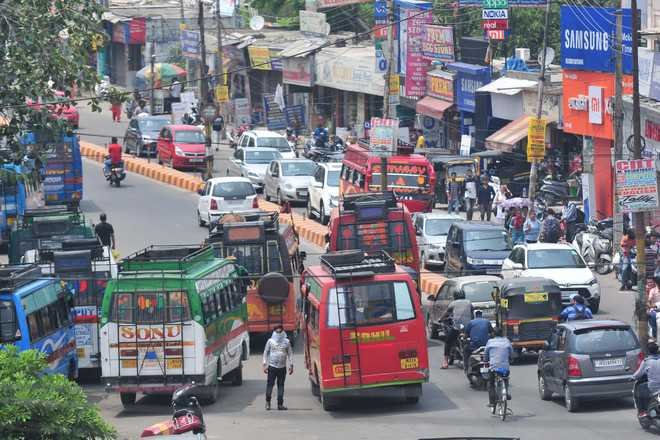The worsening traffic mess in Jammu city and its peripheries is fast turning into a daily nightmare for commuters. At the heart of the crisis are mini-buses, autos and e-rickshaws operating with near-total impunity—raising serious questions over the role of the Traffic Police.
Despite repeated complaints from citizens and clear judicial directives, enforcement remains largely invisible, fuelling public anger over negligence, complicity, and the credibility of the traffic management system in the winter capital.
Every day, commuters are forced to navigate through chaos as mini-buses halt anywhere they please—whether in the middle of the road, busy roundabouts, junctions, or even no-parking zones—causing massive jams. Most of these vehicles are poorly maintained and spew thick black smoke, converting key stretches of the city into virtual “gas chambers”. Yet, despite such blatant violations occurring in full public view, enforcement is almost non-existent.
From B C Road to Jewel Chowk, Parade to Satwari, Bantalab to Rehari Chungi Chowk via Janipur, Jewel Chowk to Talab Tillo, and Bakshi Nagar to Canal Road—the story remains the same: mini-buses blocking lanes, picking and dropping passengers at will, and choking already congested roads. Shockingly, all this happens right in front of traffic personnel, who prefer to look the other way.
Auto-rickshaws further add to the mess, with drivers stopping mid-road and operating without any discipline, while the unchecked presence of e-rickshaws—often driven by untrained drivers—has only compounded the risks for passengers and other road users.
“The Traffic Police seems content with cosmetic drives and occasional challans while the real offenders carry on unchecked,” angry commuters said. “It is astonishing that while two-wheelers and private cars are routinely fined, smoke-belching mini-buses and reckless autos are rarely punished.”
This inaction comes despite repeated directives of the Supreme Court and the National Green Tribunal (NGT) to curb pollution from unfit vehicles. Jammu’s roads remain dominated by mini-buses coughing out toxic fumes, strengthening public suspicion of a deep-rooted nexus. “If these vehicles escape action even when emitting visible smoke before the cops, it clearly proves complicity,” remarked several commuters.
The consequences, however, extend far beyond traffic jams. Experts warn that Jammu is heading towards a public health crisis. “Daily exposure to pollutants from poorly maintained vehicles raises the risk of asthma, chronic bronchitis and even lung cancer. This unchecked pollution is silently damaging public health, and every day of inaction is adding to the disease burden,” cautioned a senior pulmonologist at GMC Jammu.
“For the Traffic Police, collecting fines from bikers without helmets or car owners without seatbelts seems to be the priority. But when it comes to violations by mini-buses, autos and e-rickshaws, the force turns a blind eye,” commuters alleged.
“It is impossible that such rampant violations go unnoticed by traffic cops stationed at every major junction. The only explanation is complicity or deliberate inaction,” they asserted. “Unless the Traffic Police wakes up and takes decisive, sustained action—by seizing smoke-emitting vehicles, penalising repeat offenders, and regulating e-rickshaws—Jammu’s roads will remain chaotic, polluted and unsafe. Each day of official silence is not just an administrative failure but a betrayal of public trust with grave consequences for both mobility and health in the city. (Agencies)

